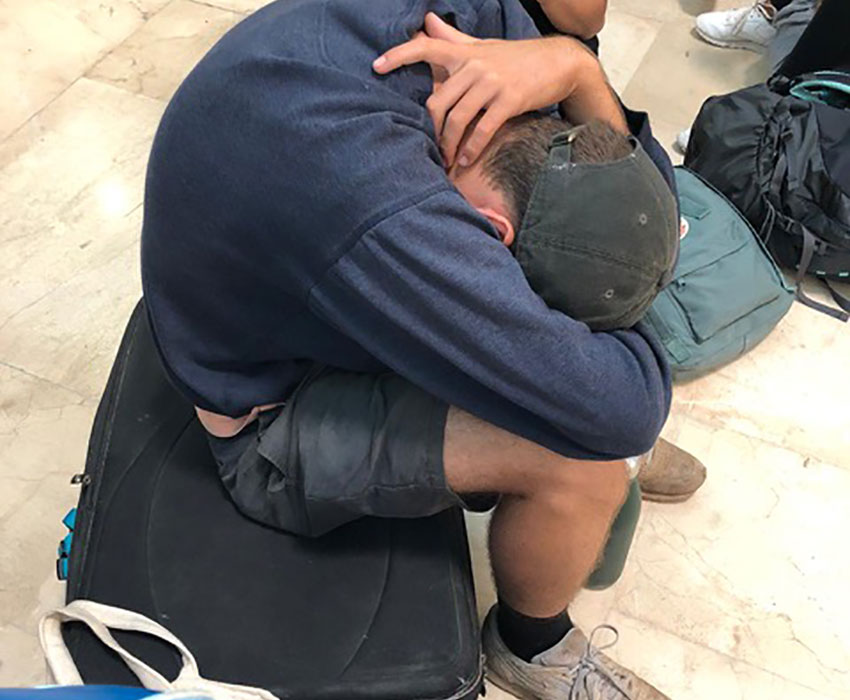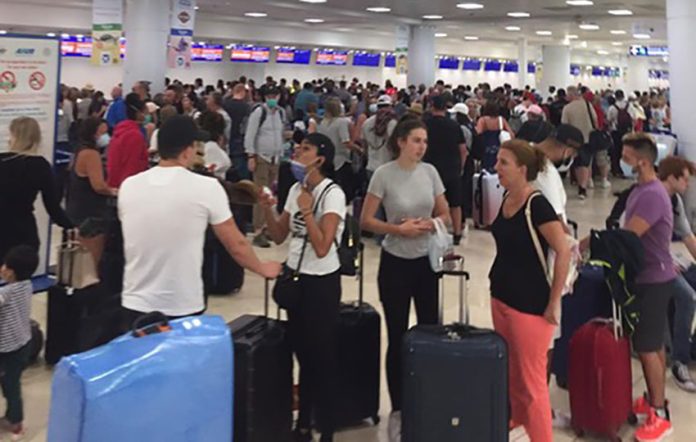Everyone hates flying, but when it takes you through that specific corridor of anxiety known as Cancún airport, the experience adopts a far more sickly nature.
More and more unfortunate souls are finding themselves forced down this path, partly due to the awareness of the escalating coronavirus problem entering the global consciousness, and partly due to the simultaneous and paradoxical lack of awareness, an ambiguity that tends to encourage the flight impulse over a more resilient desire to stand one’s ground.
On an unassuming Saturday morning, on a short trip to speak with one of the only airline companies still operating out of the city — Air Canada — about their upcoming operationality, the scale of how underprepared Mexico’s infrastructure remains becomes painfully clear.
Reactions to the Covid-19 outbreak have varied not only from country to country, but evidently from city to city. In Mexico, a country seemingly unperturbed by the impending spread, Cancun stands out like a sore thumb. The airport, which in the minds of fleeing tourists presents itself as the pearly gates of paradise, turns out to instead be a cruel obstacle course, unavoidable for any passing visitor wishing to return home.
As the world scrambles to understand the new state of play, and border closures become daily news, progressively more and more travelers are folding their cards and admitting that the stakes are in fact too high.

This explains the unprecedented (admittedly a word we’ve all heard too much of these last few weeks) congestion on entry. Early on, the queues are already outgrowing the flimsy crowd-controlling infrastructure.
What becomes clear is that the mass can be divided in two, those leaving today, boarding pass in hand aiming for the check-in desk, and those rather more dispirited groups with no flight, looking to leave by hook or by crook; but the Air Canada attendant is clear: no more spaces for at least another week. Anna from Amsterdam is due to fly in five days anyway, but tells me that with the rate at which the news cycle rotates, she has no idea if that will be possible. “I want out — now.”
But the real problem isn’t to be found here, it’s at the check-in desk. The queue shuffles forward, 300 strong, toward the lone check-in assistant at the counter. Crowd controllers are checking their watches and becoming increasingly worried that the queue isn’t falling as quickly as the minutes, and those trying to leave are restless. There are more staff handing out sanitizer than there are moving the machine and eventually the crowd becomes incandescent. Seemingly at random, the floor staff begin grabbing individuals and families from the queue. “Toronto?!”
The flight closes in three minutes as another spanner flies into the mechanism. Check-in assistants have been mis-checking visas, and so, with a booked flight already confirmed and no more for seven days, they hurriedly direct flyers to the other side of the terminal to get their visa stamped. The families are choosing their fittest and fastest, and thus begins the Cancún 2020 sports day, giving us a relay of shouting, swearing, and finally running to get the documentation required. There’s no other word for it: Cancún airport is mayhem.
The flight closes, and 40 travelers to Toronto are still standing in the queue, as they have been for 4 1/2 hours. Geraldine, from Toronto, is scared. She is 73, an expat, and thus in one of the highest risk groups for when the wider outbreak of coronavirus finally sweeps Mexico. As it stands, she won’t be leaving anytime soon despite having her flight booked and paid for weeks in advance. Asking around, the crowd aren’t short of similar stories; they have been totally failed.
This somehow feels symptomatic. At least in this context, the infrastructure, staffing, and administration are all unprepared for the social exodus. In the space of a week, non-natives in Mexico have managed to tally the deteriorating situation in Europe, a month or so ahead in the crisis timeline than Mexico, with the reality of being stranded in a country during the climax of a global pandemic.
The tepid response from the government to the ever-expanding coronavirus problem has done little to prepare workers on the ground for this human riptide which, had information been afforded in real time over the last month, would not only have stratified the waves of people leaving, but would have enabled a wider consciousness as to its inevitability.
In recent weeks, the administration has been sporadically dousing the panic with water and wafting the smoke into the other room. “Nothing to see here,” has been their line, with President López Obrador declaring last week that “We’re going to keep living life as usual,” and encouraging citizens to “continue eating out,” an instruction that stems from his desperate bid to preserve the economy.
His government’s initial PR onslaught at the outbreak, the unrelenting transmission that they are prepared and everything is under control, has fallen to the side and, in its place, the message that there was actually nothing to worry about to begin with has remained. Mass gatherings have only recently been discouraged, and bars up and down the main streets of major cities remain as bustling as ever.
The problem now for the government is that they have no control over what its population sees abroad. A message of calm distraction from the truth could only work if the fate of Europe’s major economies hadn’t already been sealed and then hand delivered to the screens of anyone who wanted a view.
Very soon, the mood in Mexico is going to shift, but we mustn’t underestimate the power that political spin has had on the general consensus up until this point. We may be about to find that the national strategy, essentially meditating in a house that is burning, while comforting in the short term, has woefully underprepared the institutions on which it is going to rely in the coming months. Airports yes, but hospitals, local governments, supermarkets seem to be sleepwalking into the new global reality.
Furiously battling against the tide does not have to be the alternative. Panic begets panic, and at the very least, Mexico has avoided some of the more graphic doom mongering perpetuated by similar economies throughout the world. But this isn’t about stirring the water or introducing artificial worry that serves nobody, it’s about recognizing a trajectory, acknowledging it, and preparing for the impact, because there will be one.
Anyone that says they can confidently quantify the collateral damage is being disingenuous, but until the leadership admits that the state of play is going to experience a tectonic shift, the country will be unprepared to brace itself.
Jack Gooderidge writes from his home in Campeche.
